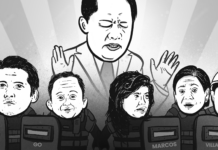WHEN it was signed early last year, the Bangsamoro Basic Law (BBL) was welcomed albeit cautiously as a road map to peace. Nowaways it is often held up as an effigy of hate, a clarion call for war. It appears that Filipinos, Christians and Muslims, have made up to break up.
But could “lasting peace,” a term thrown around these days casually, be attained through the legislation of a 99-page document that many observers believe would literally make or break the peace?
According to the history of the creation of the Autonomous Region in Muslim Mindanao (ARMM), based on its website, “human rights violations” in Mindanao during the dictatorship of President Ferdinand Marcos gave birth to the Muslim independence movement and the rebellion of the Moro National Liberation Front.
The Marcos government paved the way for the Tripoli Accord that endorsed an autonomous government in Muslim Mindanao. But the current ARMM was not signed into law until the time of President Corazon Aquino.
However, certainly not all were pleased by the agreement.
The Moro Islamic Liberation Front (MILF) had broken away from the MNLF even before the ARMM initiative and it opposed the autonomous set-up. Perhaps in what is now by now typical of Muslim rebel groups, the Bangsamoro Islamic Freedom Fighters broke from the MILF to express its rejection of the BBL, which was an accord between the government and the MILF.
President Aquino III has appealed for the passage of the BBL before his term ends in June 2016, but his request comes at a most inopportune time. In the afternath of the Mamasapano incident between the Philippine National Police and the MILF last January that left at least 60 people dead, an incident that the President himself appears to have mishandled, many sectors are in no mood to pass the BBL.
The hardline stance is perhaps best—and bombastically—articulated by Sen. Miriam Defensor-Santiago who said that the BBL is unconstitutional and should be struck down by the Supreme Court (SC).
The report of the Senate Committee on Constitutional Amendments and Revision of Codes headed by Santiago states that the Constitution should be amended if the BBL is to be promulgated. What she and other critics are offering are a stalemate and a dead-end.
But for context, let us be reminded that the SC has previously deemed unconstitutional a similar framework as the BBL.
During the presidency of Gloria Macapagal-Arroyo, the signing of the memorandum of agreement on ancestral domain was halted by the SC due to the proposed “associative” relationship between the government and the autonomous region.
Civil Law Dean Nilo Divina explained that an associative relationship “implies that there are certain powers granted to the autonomous region beyond what is really contemplated under our Constitution. It signifies that there is a mere association between the autonomous region and the central government, like a state within a state. And that was never the intention of our Constitution.”
However, the term “associative” was substituted with “asymmetric” in the BBL to avoid a repeat of the mistake.
Divina clarified that asymmetric relationship “implies that there is lack of symmetry within a particular association or relationship among several entities.”
“It is evident from [Section 20 Article X of the Constitution] that there are more powers and liberality granted to Autonomous regions more particularly in their legislative authority as compared with the powers granted to other local government and political units found in our Constitution. This is the asymmetry being described and defined with regard to the relationship of the Bangsamoro and the central government found in the Bangsamoro Basic Law,” Divina told the Varsitarian.
Clearly sorting out and determining the “assymetrical” arrangements between the Bangsamoro government unit and the central government within the parameters afforded by the Charter should be made by lawmakers first before declaring that the BBL is unconstitutional and should be rejected by the SC. This would not mean ignoring consitutional limits to the form of government enshrined in the Constitution but a consideration for authentic change in the light of the social justice provisions of the same Constitution—“human rights violation” and social iniquity being the causes of the Moro rebellion.
Obviously what is needed is an honest to goodness review of the BBL in the light of the overall aim of the Philippine Constitution of building with “the aid of Almighty God” a “just and humane society” and a “regime of truth, justice, freedom, love, equality, and peace.” Obviously too what is needed now is greater tact and diplomacy than what have been obtained so far from the legislative inquiry where bombast, not honest to goodness study and dialogue, often drown out the calls for peace and understanding.













